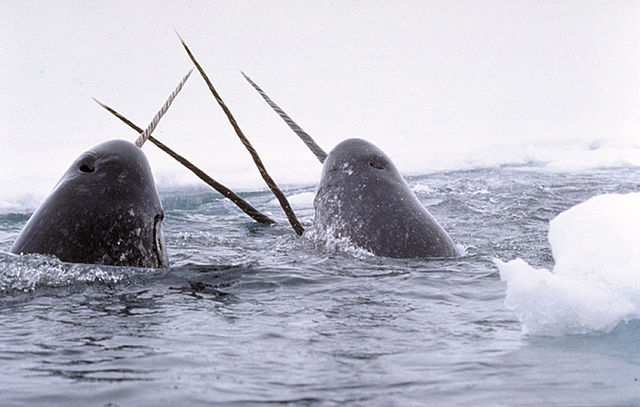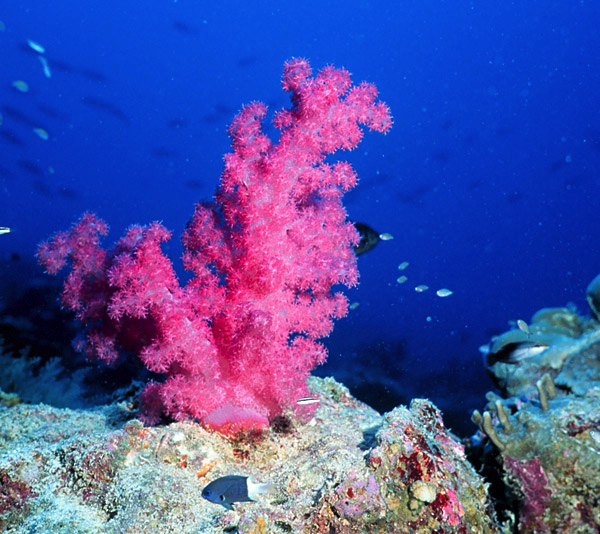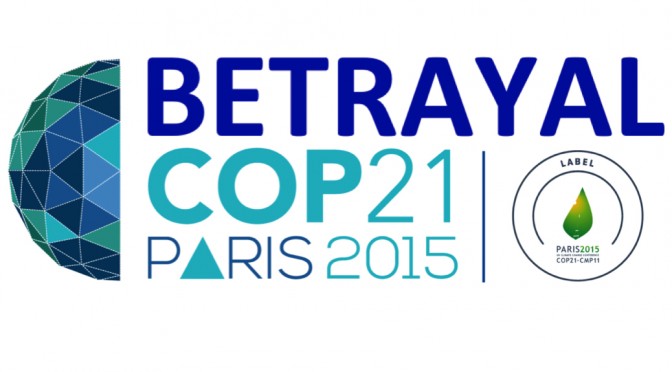Any news that’s two days old will sure be ignored. You would therefore expect everybody in that press room to have been busy spreading the news, even more so when their peers were all reporting from a „historic“ event. Not this time, though: Just then, the media granted itself a little pause to applaud, a peer recorded. „Joy without end“, one of them reported from the final moments of the conference. Its participants hugged one another. Many had tears in their eyes. Germany’s minster for the environment immediately made a statement — tears of joy in her eyes, too — about the „historic moment“. Barack Obama was pleased, too. „This is huge: Almost every country in the world just signed on to the #ParisAgreement on climate change—thanks to American leadership“, he tweeted. Will future generations be happy with the outcome of the Paris agreement? Would the non-human living nature have a reason to celebrate? There is reason for doubt.
When the Paris climate conference closed, the participants awarded one another and themselves a minute of standing ovation.
„We did it“, was the conference’s official tweet. Sure, the conference had just finished, after an extra day. Attendees could rightfully be happy to leave for home and go back to minding their own smaller business, and keep minding it the way they wanted to. What was agreed in Paris?

The Paris‘ climate conference decided on December 12, 2015, proudly and joyfully that:
- Every country on planet Earth is free to determine the amount of greenhouse gases it pleases to emit. It should announce regularly how much it wants to emit and please report afterwards what it emitted. If it emitted more than it had anticipated, there shall be no consequences.
- If a country wants to emit more in reality than officially, it can, if it wants to avoid a minor embarrassment, in an act of mutually (globally) agreed betrayal, at nearly zero expense do it by paying a small amount to a country that dares to declare that it is ready to emit more but could emit less, if it receives the money. Thereby the country that emits more can pretend to itself and others that it complies with its self-imposed emissions limit.
- „World leaders“ (declared as such by themselves as well as by a cohort of obedient „non-profits“) decided the polluter-gets-payed-principle. They did it unanimously. The door to climate blackmailing and bribing had been opened 18 years ago in Kyoto. It was pried open in Bali. Paris may lead to outright emissions extortion. The door could have been closed in Paris. Instead, the COP21, as they called the conference, decided to unhinge the door completely. Once it is there, it is difficult to get rid of the mafia.
- Emitters don’t pay the bill. The participants of the Paris conference decided that the unscrupulous should be rewarded. The governments of those who are affected by the changing climate shall (in the text) or should (in reality) be paid a minor compensation. The loudest and dirtiest will get the most. Much of that money will be taken from rich countries‘ foreign aid budget. Some of it might be used to silence those who suffer: „Here is your compensation, now shut up!“
- Polluting countries (the agreement refers to them as „developed“) should (not „shall“) „continue taking the lead by undertaking economy-wide absolute emission reduction targets“. And they „shall“ help lesser emitters („developing countries“) to discontinue to emit ever more climate wrecking gases.
- Most if not all thorough observers consider it a success that, following dispute on the matter, it was decided that countries meet again under the UN’s climate convention, a framework that cannot deliver more than the least interested participant is comfortable with. The Copenhagen climate conference had delivered honest deception. The Paris climate conference delivered betrayal, and self-betrayal. Perhaps, they should at least have agreed to not do it again.
- If a country dislikes what it just agreed to, it is free to desert the convention and its agreement, which stipulates it may heat planet Earth as it feels like, just as it used to be before the Paris conference. The president of the conference that produced the „Paris Agreement“ proudly considered and called it „binding“. No, Fabius was not resorting to sarcasm, not deliberately.
- For the first time, important emitters, among them, as a novelty, many „developed“ countries, supported the notion that limiting the temperature rise to clearly below 2 degrees, closer to 1.5 degrees, would be desirable. Progress, there was —in lip service. The Paris Agreement „notes with concern“, that the individual country pledges are largely incompatible with even the 2 degrees target. The Paris text resorts to mention („note“) a requirement for much greater emission reductions to „40 gigatonnes or to 1.5° C“ through improved voluntary pledges. The relation between the 40 billion tons mentioned and the 1.5 degree temperature objective is mysterious. But it suggests the UNFCCC fails to understand or manages to disregard the physical science basis of man-made climate change.
The conference’s core decision, however, was to agree with country specific emissions that are sure to breach the 2-degrees objective by a large margin. The Paris Agreement will come into force by the time when the amount of carbon dioxide, which will rather „safely“ induce 1.5 degrees of temperature rise, will already have been emitted. The participants of the Paris conference implicitly but proudly decided that targets shall be disregarded.
The Paris Agreement explicitly invites the scientists to compile a special report in 2018, to instruct the United Nations on what should have been done to limit the rise of the global temperature to 1.5 degrees, as if this were not already clear enough, as if this were not too late. It is easy to predict that the IPCC will again suggest negative CO2 emissions. What else should it do? Hence, it should not. The scientific basis for considering large scale negative emissions to be possible —politically feasible— is more perfectly diluted than any homeopathic remedy has ever been.

The Guardian’s George Monbiot commented the Paris conference’s outcome spot on: „By comparison to what it could have been, it’s a miracle. By comparison to what it should have been, it’s a disaster.“
If a relative miracle from a United Nations Framework Convention on Climate Change conference is an absolute disaster, the UNFCCC’s problem solving capability should finally be questioned. Can the UN provide the right framework to address the climate crisis? It is long overdue to ask this question. It is overdue to give the right answer: No, it cannot. It should quit to pretend to.
Instead of holding on to the ill-fated process of the UN, alternatives should take over to address the climate crises on a global scale. Alternatives have the potential to quickly overtake the UN’s weak approach. At least one idea for a mechanism that could be the core of an alternative was proposed ahead of Copenhagen, but it was ignored. Another one, proposed before the Paris conference took place, gained more attention. Both of these proposals originated from prominent US economists.
Influential Ernst Ulrich von Weizsäcker had long ago proposed Realpolitik to address the environmental crisis —at least as a word. True leadership by a big polluter will be required to get the word to act on climate change.
Tragically, everybody agreed to the absolute Paris disaster —almost. Every country did —almost. But every country is not everybody.

We ignore the opinion of, say, narwhals, corals or phytoplankton. Their requirements are rather well known, but they were easy to disregard. On the historic 12th day of December 2015 it was consented by those „duly authorized to that effect“, to disregard the requirements of many life forms on planet Earth and drive them to extinction.
It is not the first time a species alters the climate and thereby wipes out much of life. It happened before, more than once.
For example, about 650 million years ago, masses of one little species pulled carbon dioxide out of the atmosphere at such a rate that planet Earth froze over almost completely. It certainly destroyed most of evolution’s by then 3 billion years worth of achievements. But now, for the first time in Earth’s history, one species sets out to destroy much of life knowingly. The species in charge —duly authorized or not— calls itself sapiens. Our „leaders“ are proud of it. The media applaud. The Paris Agreement is truly a historic decision.
Unlike historic decisions that lie further back in time —think of the Weimar Republic’s empowerment of Hitler as one example— the consequences of the decision taken in Paris two days ago can still be fended off and reversed without excessive hardship. True leadership and courage to resort to Realpolitik will be required. Time is in short supply. Paris is not the end. It should be the end of the beginning. Paris should end this awfully long period of climate appeasement. It should end the too long period of self-betrayal that the UN can deliver on climate change.

